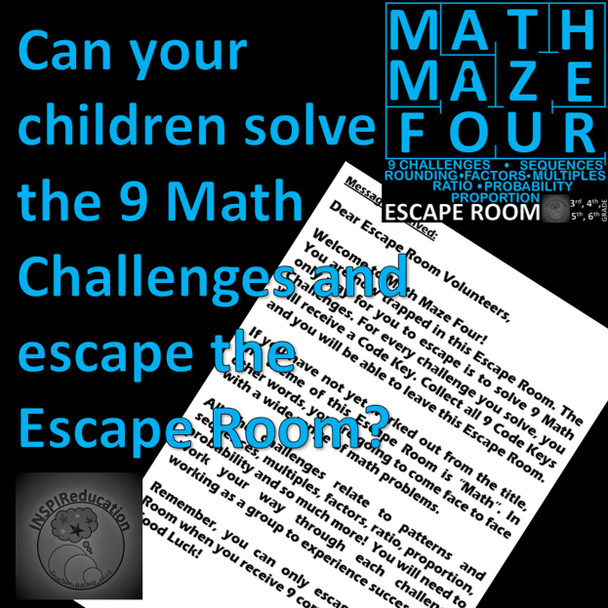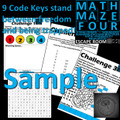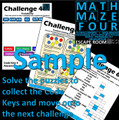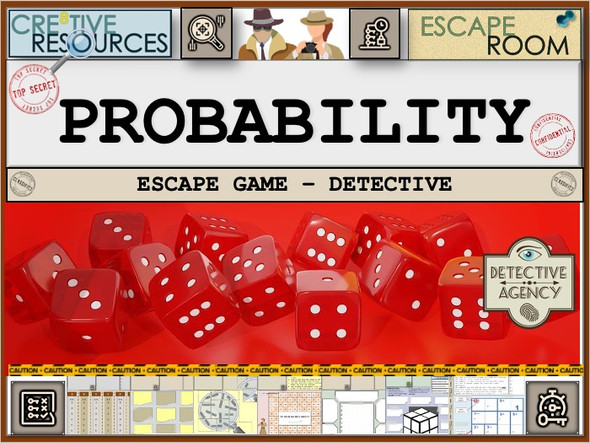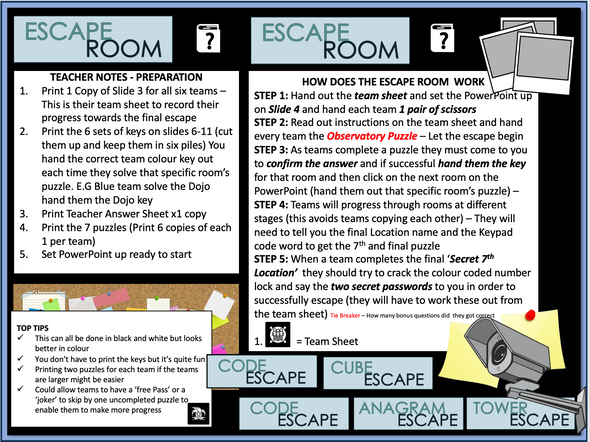Maths Problem Solving - Number (fractions, probability, sequences), Shape, ESCAPE ROOM
- Bulk Pricing:
- Buy in bulk and save
- Contributor:
- INSPIReducation
- Grade Level:
- 3, 4, 5, 6
- Product Type:
- Escape Room, Problem Solving, Math Topics, Language, Math Skills
- File Type:
- ZIP, PDF
- Pages:
- 55
- Answer Key:
- Yes
Description
Using an Escape Room to develop curriculum knowledge is an exciting activity that will inspire learners from 3rd Grade to 6th Grade.
The curriculum content of this Escape Room is linked to:
· Math topics of number and shape
The aim of the Escape Room is to provide jeopardy for the children to work under pressure to solve 9 challenges to save them from being locked in the Escape Room.
Before beginning, you will need to prepare the following:
· A copy of the Pupil Workbook for each group
· A set of table activities for every group – prepared beforehand and given to each group after they have all completed each Code Key activity
· IT sources and research materials in math
· Initial Starting Script sharing the problem to the children
· Completion Script celebrating the completion of the challenge
Children will need to be in a team that, when working together, have a good grasp of number and shape. Reference is regularly made to all times tables. This Escape Room is ideal as a review of learning.
The activity begins by the teacher reading the Initial Message received. It clearly tells the children that they are required to solve 9 Challenges to escape the room. The only way they can get out is to collect 9 Code Keys. Failure is not an option!
What follows are 9 activities which the children must solve to discover the code to move onto the next activity.
Each activity focuses and builds the children’s knowledge in math:
The 9 activities are based on the following topic areas:
· Sequencing and methodical ways of working
· Factors of all the numbers from 1 – 40
· Common Factors of two and three numbers
· Arranging the language of probability on a number line
· Problem solving probability in real life, fraction outcomes
· Rounding numbers to the nearest 1, 10, 100 and 1000
· Factors of numbers between 1 and 100
· Four operation language Word Search (27 words to find)
· Proportion in shape – Scaling up (Scale Factors)
When all 9 activities are completed, and the children have gained the correct Code Keys from each activity, the teacher can read the final communication detailing how the children have been able to escape from the room
Setting up the Escape Room
1. Before starting the activity – set up 9 tables with each of the Challenges on one of the tables. Within the resource booklet, table labels have been provided for each of the 9 challenges.
2. Children should be split into groups of no more than four and be placed in their own work space.
3. Access to IT and research materials should be provided to allow children to research answers to questions and review their own knowledge, as well as checking answers.
4. Each group should have a Code Key Booklet and decide on a team name
5. Read the Initial Message to the children to set the challenge in context. Discuss what this means, and what the activity entails.
6. Each group can then move to one of the set-up tables. The teacher can decide on the time the groups will have to complete each of the Challenges. Set the timer and the children complete the first Challenge they have arrived at.
7. Once the time is up on the first Challenge, the teacher may decide to check the accuracy and pace at which the children have worked at and can use the Answer Booklet to quickly assess whether the children achieve that Challenge (of course, this can also be done at the end as to maintain a sense of drama and keep the activity moving).
8. The children should then move onto the next Challenge sequentially. Therefore, if they started at Challenge 5, they should move onto Challenge 6, then 7, 8, 9, 1, 2 and so on.
9.The groups should move on through the challenges until all 9 have been completed – collecting all 9 Answer Keys.
10. At the end of the Escape Room Challenge – approximately two hours, the teacher can go through each of the Challenges to check the answers which the groups have. IF they have all 9 Code Keys, they have successfully solved the Maths Escape Room and can escape!
11.For those groups who have been successful, the teacher should then read the completed statement where they find out how successful they have been.
The Escape Room should last for 2 hours.
We hope that your children enjoy this Escape Room.
Thank you for visiting our store and viewing our products
Best wishes
INSPIReducation


